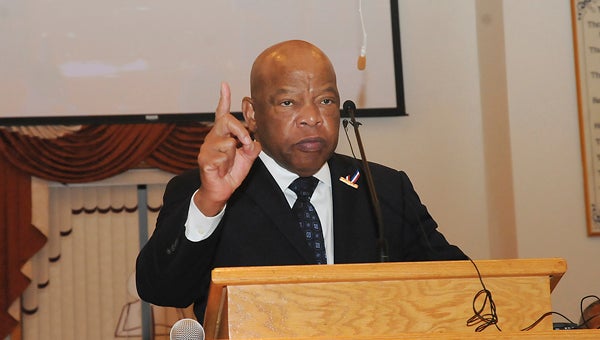Bill would gives 90 percent of half-cent sales tax to county schools
Published 8:24 pm Wednesday, April 29, 2015

While the amount of tax charged remains the same, how that money is distributed would be vastly different if a proposed bill is approved by the legislature.
A bill in the Alabama Legislature would repeal Dallas County’s half-cent sales tax for schools and replace it with another half-cent tax.
While the amount of tax charged remains the same, how that money is distributed would be vastly different if approved by the legislature.
Under the proposed bill, 90 percent of the tax will be given to the Dallas County Board of Education and 10 percent to the Selma City Board of Education.
As things stand today, the city and county almost split the revenue 50-50 based on student population, but that wasn’t always the case.
In September 2012, the Dallas County Commission approved a half-cent sales tax to help the county system meet a state law concerning financial reserves.
The state requires schools to have one month’s operating revenue in savings, or about $2.2 million for Dallas County. At the time the tax was approved, the system had less than $100,000 set aside.
Auditors discovered in 2014 that the tax should have been split evenly between the county and city schools. By then, approximately $2 million had been collected, meaning Dallas County Schools owed the city system $1 million.
The proposed bill would give most of the revenue back to Dallas County, which supporters say was the commission’s intent in the first place.
“Dallas County receives about a million dollars less in revenue than the city of Selma, but they have about the same number of students,” said State Senator Hank Sanders. “It’s just trying to carry out what was originally intended … what the county commission was originally trying to do.”
Estimates gathered Wednesday put the number of Dallas County students at 3,300, while the city of Selma has between 3,600 and 3,700 pupils.
Probate Judge Kim Ballard agreed the commission’s intent was for the money to go to the Dallas County system. The Legislature has the ability to divide the tax anyway it wishes.
“The reason we passed it was the Dallas County School System was in trouble with their reserves,” Ballard said. “I think the new legislation was designed to restore the bulk of the money to the Dallas County Board of Education.”
While both systems could use more funding, Ballard said the county system has less resources than the city.
“Neither one is overfunded by any means, but the Dallas County School System was terribly underfunded,” Ballard said. “I hope it passes without controversy because it restores the original intent of the commission.”
Dallas County Superintendent Don Willingham said over the last 11 months the system has worked to get the tax and reserve issues resolved.
“We are excited as a system. It is money we needed for our operations and to build the state-required reserve,” Willingham said. “It was money we had budgeted so it caught everyone by surprise, including the Selma City School System, last year when it was discovered that the money was suppose to be split.”
Willingham said from June 2014 to June 2015 the county would have paid the city school system more than $900,000 that was intended for the county system.
“It’s hard when you budget for a whole year and you do contracts for employees. You commit to certain expenses, and you commit on the revenue you expect and then all of a sudden, boom, from one day to the next, almost a million dollars is taken from you.”
Approximately $2 million was collected from December 2013 until the county amended the tax in June 2014 to split the tax based off student population.
Selma leaders have contended their system is owed half that revenue but no agreement has been finalized to repay the $1 million.
The city system is still planning its response to the proposed bill that would take approximately just under $1 million annually from the system.
New superintendent Angela Mangum has been on the job less than a month and said she will lean on her board of education and the Alabama Department of Education in how to proceed. Mangum said she spent the majority of her day in meetings Wednesday and declined further comment until she had a chance to examine the bill in its entirety.
Larry DiChiara was acting superintendent for more than a year before Mangum was hired. He continues to work with the state as chief administrative officer of the city system.
“It does concern me because obviously I spent 15 months trying to build the reserve and trying to pay bills and improve the infrastructure and things like that. When you rely on that money and all of a sudden it’s gone, it would concern me or the new superintendent who took my place,” DiChiara said. “It’s really a fight that the new superintendent and this board and this community would have to take on.”
Selma City Schools Board President Henry Hicks used stronger words in his opposition to the tax change.
“The county gets 90 percent, and we get 10 — that’s unacceptable,” Hicks said.
Hicks said he was speaking based on his personal opinion, but believed fellow board members would be against the change.
“We’re probably going to prepare a resolution that we are against that particular bill. If it can be reapportioned on a more equal basis, then I think we will be able to agree to it,” Hicks said. “I know the county as well as us, we’re all struggling. We’re not trying to hurt the county or anything, but I don’t feel that the county should hurt us as well.”
Efforts to reach Rep. Melton for his position on the bill for were unsuccessful Wednesday afternoon and evening. Check back for updates later in the week.
Selma Times-Journal staff writer Daniel Evans contributed to the story.



